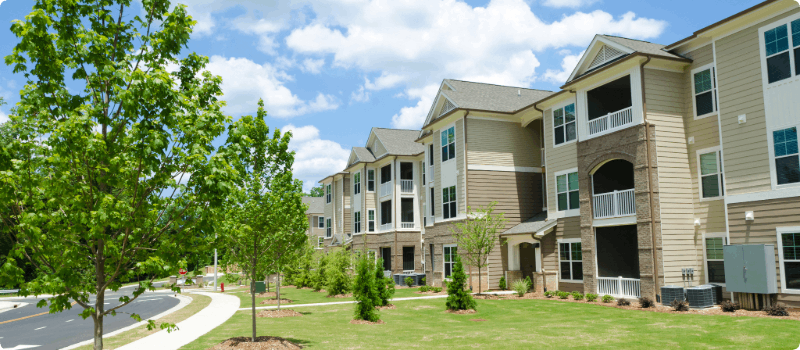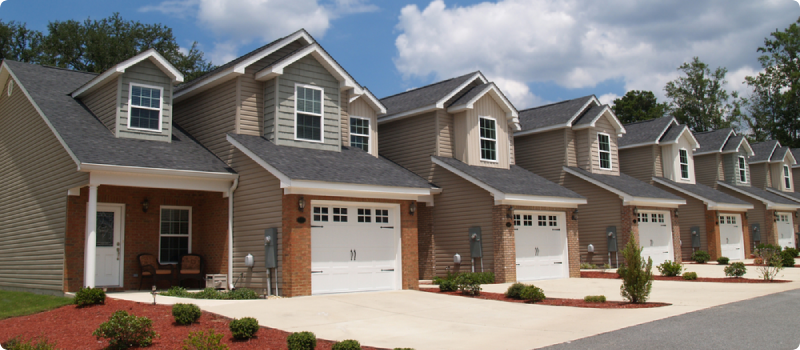What’s a co-op home?
Updated March 8, 2024 . AmFam Team
Short for “cooperative,” a co-op is a concept that borrows from the idea that teamwork makes a community whole. And purchasing a home that’s part of a co-op is different from the traditional way real estate is bought as well.
So, what is a co-op home? By definition, a co-op, or a “cooperative home,” is usually a multi-family piece of real estate in which a business holds the title to the property. The residents gain equity in the building by buying shares in that business. Co-op residents own a share of the property but not the deed to the property itself.
This relationship is akin to holding stock in a company, more than owning a piece of real estate. Co-ops are popular for a number of reasons and come with a unique set of benefits and drawbacks. We’ll explore the tax implications for co-ops to get an understanding of the long-term financial implications of co-op housing.
Co-op housing pros and cons
When co-ops succeed, it’s usually because their business decisions are tightly controlled by the resident members, who act as shareholders. This approach tends to protect the overall financial health of the entire building in contrast to condo ownership, where a resident’s stake is more focused on their own parcel of property.
What are the co-op housing pros?
One of the benefits of buying into a co-op is that there are more of them available than condos in certain markets. If you’re shopping for real estate in those areas, your purchasing options are greatly increased when you include co-ops. Here are other benefits of buying into a co-op:
Co-op owners have property rights. Although each co-op’s bylaws and resident agreements differ, they usually provide shareholders with a voice that extends beyond their unit.
Co-op owners usually share property taxes. While situations can differ, each shareholder typically pays taxes based on their property ownership percentage. So, if you own 30% of the property, you would be responsible for 30% of the property's taxes.
Co-ops deliver strong tenant protections. Compared to renters, co-op residents enjoy housing rights more akin to homeownership. Democratically operated, living in co-operative housing gives residents more of a voice on business decisions as well, assuming that their financial obligations are met, and actions conform to bylaws.
Co-ops hold tax-sheltered financial reserves. With the IRS treating a co-op’s tax reserves as “patronage income,” financing projects in co-ops can be less costly when compared to similar ventures in commercially operated buildings.
Co-ops are less likely to rent out their unit. When compared to condo owners, co-op residents can prohibit absentee ownership more strictly.

What are the co-op housing cons?
With a board of directors steering major purchase decisions and other financial matters, residents may be left to pay out large sums to finance certain ventures — which is sometimes viewed as a drawback. For instance, when a new roof is needed, the entire co-op will be required to fund the project. If the total cost is $120,000 for the roof, and there are 12 co-op shareholders, they’ll each be responsible for coming up with $10,000.
Other disadvantages to co-op housing worth noting may include:
Residents may be required to handle property management chores. Some co-ops require owners to share building maintenance tasks, which may be too much to ask. Ensure you know your expected responsibilities before committing to a co-op. There may be penalties, such as fines, for failing to live up to your ownership responsibilities.
Subletting is limited. Some groups only allow a small number of individual units to be sublet and may force multi-year leases on those who do. If your plans change after you’ve purchased, and you’d like to rent out the space, you may not be able to do so if all the available rental slots are taken.
Types of housing are limited. Given that most co-ops are multi-unit buildings, your co-op purchase options are restricted when opting for this type of housing.

Co-op housing and taxes
Given that co-op boards vary, fully understanding their bylaws before purchasing a living space is essential. You’ll also want to obtain the residents-to-sublets ratio to ensure you qualify for certain tax benefits. Here are other important co-op tax considerations:
Tax deductions are handled differently. Considered a common interest development, co-ops may benefit from mortgage interest deductions — but only when certain criteria are met. Unlike buying a house, you’ll need to be sure these criteria are satisfied before purchasing, if you want to leverage that deduction.
Co-ops may see higher monthly charges. Compared to condo HOA fees, co-op monthly charges — some of which are used to pay state and federal taxes — can be significantly greater. However, it’s also likely that some of those maintenance charges are tax deductible, which may help offset the cost.
Some co-op property sellers may be subject to a “flip tax.” When weighing out cooperative housing advantages and disadvantages, this one’s key. You may be responsible for a flip tax totaling 1% – 2% of the total sales cost.
Although not technically a “tax,” the flip tax is really a co-op-imposed transfer fee, which is payable to the co-op at closing. This fee helps the co-op manage and offset overhead costs without impacting the current residents.
Property tax responsibilities are usually shared. Do you pay property taxes on a co-op the same way you do on a normal home? In short, no. While co-ops can vary, property taxes are usually based on ownership percentage.
While you’re shopping for homes, check in with your American Family Insurance agent to find out how purchasing a co-op can impact your insurance premiums and coverage options. You’ll get great coverage that suits your unique needs, whether you’re purchasing a condo, co-op or a new single-family home.
This article is for informational purposes only and based on information that is widely available. This information does not, and is not intended to, constitute legal or financial advice. You should contact a professional for advice specific to your situation.

